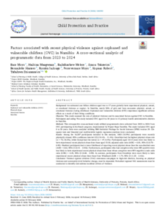Displaying 1 - 10 of 32
This study assessed the prevalence and factors associated with physical violence against orphaned and vulnerable children (OVC) in Namibia, using data from 16,507 participants in the Reach program. Findings show that 10.9% of OVC experienced recent physical abuse, with variation across districts and age groups, highlighting the need for targeted violence‑prevention campaigns, community-level behavior change initiatives, and regular regional assessments to address localized drivers of violence.
In this webinar, a new paper on strategies to prevent family separation is presented. Examples from Rwanda, Kenya, Uganda and Namibia are presented.
Minister of gender equality, poverty eradication and social welfare Doreen Sioka yesterday took a stand against harmful cultural practices, including early and arranged marriages for children.
This paper reports the findings from a small qualitative study into child fosterage undertaken in Namibia in 2019.
This chapter examines the cultural logic of child care in Africa, focusing on one variation of fosterage, okutekula, among the Ova-ambo in Northern Namibia.
This foundational chapter attempts to provide readers with content to assist in their understanding of the characteristics, role, and experiences of kinship elderly caregivers of children affected and/or infected by HIV and AIDS.
This paper examines all policy and laws related to families in the South, West, East and Central regions of sub-Saharan Africa.
REPSSI is hosting its 5th biannual Psychosocial Support (PSS) Forum, under the theme “Breaking Barriers…Creating Connections” which is organised jointly by the Government of Namibia.
The special issue of Emerging Adulthood titled “Care-Leaving in Africa” is the first collection of essays on care-leaving by African scholars. This article, coauthored by scholars from North and South, argues in favor of North–South dialogue but highlights several challenges inherent in this, including the indigenizing and thus marginalizing of African experience and scholarship and divergent constructions of key social concepts.
This article initiates the conversation on the conceptualisation of child neglect in Namibia, reporting findings from a small study undertaken in 2017.

